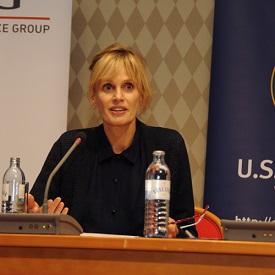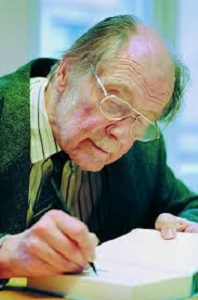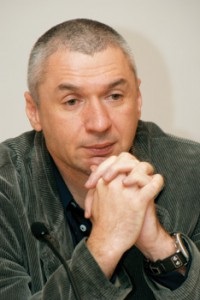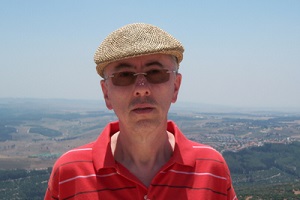|
De Amerikaanse schrijfster en essayiste Siri Hustvedt werd geboren op 19 februari 1955 in Northfield, Minnesota. Zie ook alle tags voor Siri Hustvedt op dit blog.
Uit: The Sorrows of an American
“The day Inga and I began working, the weather outside was heavy. Through the large window, I looked at the thin layer of snow under an iron-colored sky. I could feel Inga standing behind me and hear her breathing. Our mother, Marit, was sleeping, and my niece, Sonia, had curled up somewhere in the house with a book. As I pulled open a file drawer, I had the abrupt thought that we were about to ransack a man’s mind, dismantle an entire life, and without warning a picture of the cadaver I had dissected in medical school came to mind, its chest cavity gaping open as it lay on the table. One of my lab partners, Roger Abbot, had called the body Tweedledum, Dum Dum, or just Dum. “Erik, get a load of Dum’s ventricle. Hypertrophy, man.” For an instant I imagined my father’s collapsed lung inside him, and then I remembered his hand squeezing mine hard before I left his small room in the nursing home the last time I saw him alive. All at once, I felt relieved he had been cremated.
Lars Davidsen’s filing system was an elaborate code of letters, numbers, and colors devised to allow for a descending hierarchy within a single category. Initial notes were subordinate to first drafts, first drafts to final drafts, and so on. It wasn’t only his years of teaching and writing that were in those drawers, but every article he had written, every lecture he had given, the voluminous notes he had taken, and the letters he had received from colleagues and friends over the course of more than sixty years. My father had catalogued every tool that had ever hung in the garage, every receipt for the six used cars he had owned in his lifetime, every lawnmower, and every home appliance—the extensive documentation of a long and exceptionally frugal history. We discovered a list for itemized storage in the attic: children’s skates, baby clothes, knitting materials. In a small box, I found a bunch of keys. Attached to them was a label on which my father had written in his small neat hand: “Unknown Keys.”

Siri Hustvedt (Northfield, 19 februari 1955)
De Engelse schrijfster Helen Fielding werd geboren in Morley, Yorkshire op 19 februari 1958. Zie ook alle tags voor Helen Fielding op dit blog.
Uit: Bridget Jones: Mad About the Boy
‘Jones, you little devil,’ growled Daniel when I called. ‘What are you wearing, what colour are your knickers and how are my godchildren?’
Daniel Cleaver, my former Emotional F___wit ‘boyfriend’ and Mark’s former arch-enemy, has, to his credit, really done his best to help since Mark was killed. After years of bitter one-upmanship, when Billy arrived the two of them finally made it up and Daniel is actually the children’s godfather.
Daniel’s best isn’t exactly everyone’s best: the last time he had them to stay, it turned out he just wanted to impress some girl by boasting that he had godchildren and . . . suffice it to say he dropped them off at school three hours late, and when I picked up Mabel later, her hair was in an incredibly complex plaited chignon.
‘Mabel, what fabulous hair!’ I said, imagining Daniel had brought John Frieda in to do full hair and make-up on Mabel at 7.30 a.m.
‘De teacher did it,’ said Mabel. ‘Daniel brushed my hair wid a fork,’ adding, ‘it had maple syrup on it.’
‘Jones? Are you still there, Jones?’
‘Yes,’ I said, startled.
‘Babysitting call, Jones?’
‘Would you . . . ?’
‘Absolutely. When were you thinking?’
I cringed: ‘Tomorrow?’
There was a slight pause. Daniel was obviously doing something. ‘Tomorrow night is absolutely fine. I find myself at a loose end, having been rejected by all human women under the age of eighty- four.’ Awww.
‘We might be quite late, is that OK?’

Helen Fielding (Morley, 19 februari 1958)
De Estlandse schrijver Jaan Kross werd geboren op 19 februari 1920 in Tallin. Zie ook alle tags voor Jaan Kross op dit blog.
Uit: The Czar’s Madman (Vertaald door Anselm Hollo)
“However, none of those invited deigned to appear. Some were traveling abroad, others had taken to their beds due to a cold brought on by the autumn weather, or they had some other excuse. Consequently, we did not take our meals in the dining room which was close to the kitchen and hence afflicted by the odours of cooking – Timo couldn’t stand those – but in the green tea salon next to the drawing room. The table, however, was set with the von Bock family’s heavy silver. I had heard that old Baron von Bock had died a poor man, through no fault but his own (in the summer of 1812, as a captain in charge of military hospitals during Buonaparte’s offensive, of “hospital fever”). Hence, Timo had to be a poor man as well… But it wasn’t only the family silver that made me realize a curious thing it is, this poverty of the wealthy.
At dinner, Dr Robst faced me across the table. He cared for the health of the inhabitants of the estate and also attended the leaseholder of Poltsamaa, von Wahl, and the owners of the castle, the Bobruiskys, whenever they appeared in Poltsamaa between their sojourns in St Petersburg and Paris. In addition, Dr Robst collected butterflies and occasionally directed artisans’ children in performances of excerpts from Lessing’s or Kotzebue’s plays. He always arrived at the table quite red in the face from the exertion of walking the two hundred paces from the old main building, the one known as The Foundation, to the manor. Even before we were seated, and also between bites of dinner, he recited quotations from Rousseau in a theatrical voice, or gave lectures on the song birds of the region, punctuating these by whistling various birdsongs. He provided the scientific background to each one these and always, with a bow, begged Madame to excuse the whistling.”

Jaan Kross (19 februari 1920 – 27 december 2007)
De Duitse schrijfster, regisseuse en actrice Helene Hegemann werd geboren in Freiburg im Breisgau op 19 februari 1992. Zie ook alle tags voor Helene Hegemann op dit blog.
Uit: Jage zwei Tiger
„Er würde für den Rest seines Lebens allein bleiben. Seine Mutter hatte ihm ununterbrochen ein Mantra vorgebetet, dass er davonlaufen müsse, wenn er sich nicht wehren könne, und Feuer oder Vergewaltigung schreien. Er solle brennen, wilder sein als seine Provokateure und zugleich wie ein Renaissancegemälde aussehen, egal, ob er sich vor einer für 800 Euro mit englischen Seidenmalereien tapezierten Betonmauer befinde oder in vergletscherten Kesselmoorlandschaften. Kai konnte laufen, es kam ihm vor, als hätte die Natur seinen erbärmlichen Menschenkörper in ihrer Gewalt, schmerzhaft und unbezwingbar. Trotzdem schützte ihn der verdreckte Wald mit seiner natürlichen Gleichgültigkeit vor einer Realität, in der ihm längst instabile Knochenbrüche mit Polytrauma diagnostiziert und ein mit Pinguinen bedrucktes Nachthemd übergezogen worden wäre, hier zu sein war die einzige Möglichkeit, die Zeit anzuhalten und eine Strategie zu entwickeln, die Scheiße auszuhalten, irgendwie durchzukommen, durch diesen fürchterlichen hellen Tag. Alles war zu hell, es war unerträglich. In seine Beckenknochen liefen aufgrund diverser Gefäßverletzungen gerade ein bis zwei Liter Blut, nebensächlich, kalter Schweiß, zerquetschtes Unterhautfettgewebe in der Breite eines Autoreifens, es war wirklich egal. Ihm fiel eine Geschichte ein, die er oft gehört hatte, als er klein war – von einem erfolglosen Exfreund seiner Mutter, Halbindianer mit einem von Leberflecken übersäten Körper und dunklen Haaren bis zum Arsch.“

Helene Hegemann (Freiburg im Breisgau, 19 februari 1992)
De Russische schrijver Dmitri Lipskerov werd geboren op 19 februari 1964 in Moskou. Zie ook alle tags voor Dmitri Lipskerov op dit blog.
Uit: The Last Sleep of Reason (Vertaald door Dmitri Priven)
“Karapetian was scratching his sideburns without saying a word, but thought deep down that Captain Sinichkin was a complete nobody, wearing on his shoulder-straps the star that was rightfully Karapetian's.
As usual, the Armenian lunch was served at two; poor Zubov again was getting bashed. The topic chewed over was Russian woman's influence on Armenian man's psyche. One of the officers even suggested that a relationship with a fair-haired people causes the Caucasus man to lose hair five times as fast, and not only on the head but also chest and back.
Sergeant-major Zubov tried to elucidate what the connection was between the psyche and baldness, but was commanded to shut up; however, swallowing a piece of roast lamb, Zubov-Zubian expressed protest in the form of unbuttoning his uniform. A perfect silence reigned over the table when the dining audience had beheld a stupendous sight, which Sinichkin named to himself "A Sheep Before Shearing". The sergeant-major's chest was a darker shade of black so dense was the hair on it. His skin was not showing one bit under the brunette vegetation, and the seasoned Armenians sulked in view of such hormonal assets of their colleague.
Zubov offered to model his back and behind, hinting vulgarly that the degree of shagginess on those body parts is no less than on his chest, but the officers waved him off, and Major Pogosian warned that he would shoot the moron if he took his pants off at the dinner table.
Such was Sergeant-major Zubov's little victory over his fellow countrymen, and he was flashing a conceited smirk from under his multi-tiered nose all afternoon.
After lunch Major called Sinichkin to his office for a briefing."

Dmitri Lipskerov (Moskou, 19 februari 1964)
De Duitse dichter en schrijver Björn Kuhligk werd geboren op 19 februari 1975 in Berlijn. Zie ook alle tags voor Björn Kuhligk op dit blog.
NACH DEN SCHÖNHEITEN
Böse Frauen kommen aus dem
Paßbildautomaten, nette Männer
verletzen sich selbst, sie paßte da
nicht rein, in keine Schublade, sie
tanzte wie ein zwischen zwei Fingern
geklemmtes Rotkehlchen und dann ihr
Lidschlag und kein Trost dazwischen
streute sie auf leisen Sohlen eine Hand
voll Blicke in den Raum, die Hände
zugewachsen mit 928-Silber, tanzte sie die
Freitagnacht zu einer Hauptschlagader
und ihr Kleid, so muß man es beteuern, war
ein mit Hochmut sich füllendes Gewebe

Björn Kuhligk (Berlijn, 19 februari 1975)
De Oostenrijkse schrijver Wolfgang Fritz werd geboren op 19. Februar 1947 in Innsbruck. Zie ook mijn blog van 19 februari 2009 en ook mijn blog van 19 februari 2010.
Uit: Für Kaiser und Republik
“Die Himmelpfortgasse in Wien ist eine stille und elegante Nebengasse, die von der betriebsamen Kärntner Straße zum prachtvollen Parkring führt. Ihren all zu viel versprechenden Namen hat sie von einem Kloster, St. Agnes zur Himmelspforte, das sich von 1535-1783 hier befand. In den Jahren 1696-1724 hat der Prinz Eugen, Feldherr der Türkenkriege, und damit zu Macht, Ruhm und Reichtum gekommen, sein Stadtpalais in dieser Gasse errichtet. Als er 1736 starb, erbte es seine Nichte, die es so sehr verludern ließ, dass die stets ordentliche Kaiserin Maria Theresia es ihr abkaufte und der Verwaltung des Staatsvermögens zugänglich machte.
Am 20. März 1848 entstand hier das Finanzministerium. Es ist wie die ganze staatliche Verwaltung ein Produkt der Revolution, die zwar insofern als gescheitert bezeichnet werden muss, als an ihrem Ende nicht Demokratie und Menschenrechte standen. Es ist ihr aber gelungen, die altfeudalen Wirtschaftsverhältnisse zu überwinden, und über das ganze so vielgestaltige Reich einen einheitlichen und nach den damaligen Verhältnissen fortschrittlichen Administrationsapparat zu legen.”

Wolfgang Fritz (Innsbruck, 19 februari 1947)
Zie voor nog meer schrijvers van de 19e februari ook mijn blog van 19 februari 2013 deel 1 en 2 en ook mijn blog van 19 februari 2011 deel 2 en eveneens deel 3.
19-02-2014 om 19:51
geschreven door Romenu 
Tags:Siri Hustvedt, Helen Fielding, Jaan Kross, Helene Hegemann, Dmitri Lipskerov, Björn Kuhligk, Wolfgang Fritz, Romenu
|

